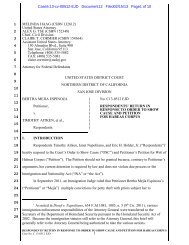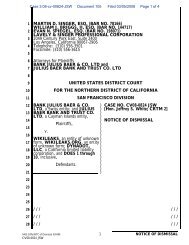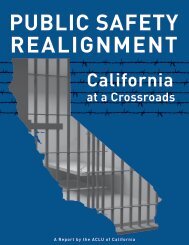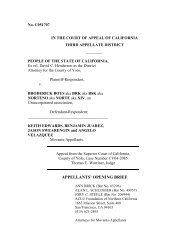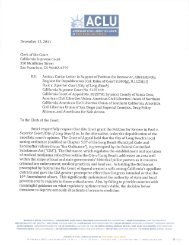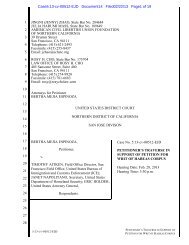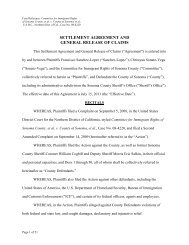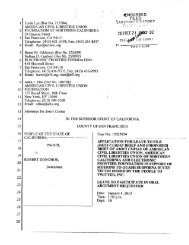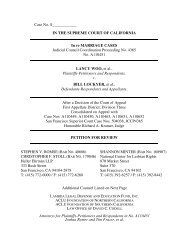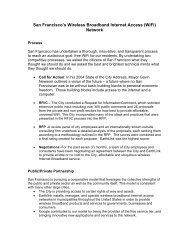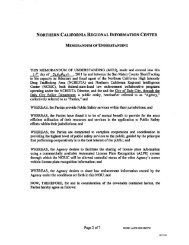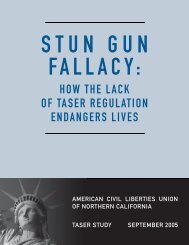1 of 2 - ACLU of Northern California
1 of 2 - ACLU of Northern California
1 of 2 - ACLU of Northern California
You also want an ePaper? Increase the reach of your titles
YUMPU automatically turns print PDFs into web optimized ePapers that Google loves.
Case M:06-cv-01791-VRW Document 254 Filed 04/20/2007 Page 29 <strong>of</strong> 3212345678910111213141516t718!920whether the case could nonetheless proceed.(U) The "very subject matter" inquiry concerns whether the "central facts"--i.e., "thosefacts that are essential to prosecuting the action or defending against it"--are state secrets. EliVlasri,2007 WL 625130, at * I0 (emphasis added).It is clear from precedent that the "central facts" or "very subject matter" <strong>of</strong> a civilproceeding, for pu.rposes <strong>of</strong> [a] dismissal analysis, are those facts necessary to litigateit--not merely to discuss it in general terms.ld. In Kasza, for example, the Nihth Circuit held that the "very subject matter" <strong>of</strong> the case was astate secret because the specific information needed to adjudicate the plaintiffs’ claims was~rotected by the privilege assertion. See Kasza, 133 F.3d at 1170. Similarly, in Fitzgerald v.9enthouse Int ’l, Ltd., 776 F.2d 1236 (4th Cir. 1985), the court held that the very subject matter<strong>of</strong> that case was a state secret "due to the nature <strong>of</strong> the question presented in this action and thepro<strong>of</strong> required by the parties to establish or refute the claim." Id. at 1237 (emphasis added).Likewise, in Zuckerbraun v. United States, 935 F.2d 544 (2d Cir. 1991), a case concerningwhether a missile defense system aboard a U.S. Navy frigate malfunctioned, the very subjectmatter <strong>of</strong> the case was a state secret because facts central to proceeding, including how thesystem worked, were not available. See id. at 547-48.~°(U) The Court’s effort in Hepting to distinguish these cases as involving "classifieddetails about either a highly technical invention or a classified relationship," see Hepting, 439 F.Supp. 2d at 993-94, misses their key point: if state secrets are essential to deciding a case, thevery subject matter <strong>of</strong> the case is a state secret and the case must be dismissed.2122232425262728~0 (U) Similarly, in Sterling v. Tenet, 416 F.3d 338 (4thCir. 2005), a case concerning whether aformer CIA <strong>of</strong>ficer had been discriminated against on the basis <strong>of</strong> race, the "very subjectmatter" in that case was a state secret because facts concerning the <strong>of</strong>ficers assignments andCIA operations were essential to decide the case. And in Clift v. United States, 808 F. Supp.101, 111 (D. Conn. 1991), the subject matter <strong>of</strong> the case--a patent dispute over a cryptographicdevice--was a state secret because the evidence needed to decide the case was privileged.Public Memorandum <strong>of</strong> the United Statesin Support <strong>of</strong> Motion to Dismiss or for SummaryJudgment, MDL No. 06-1791-VRW-21-



